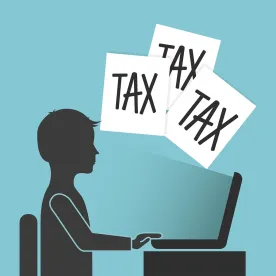On March 28, 2017, the US Tax Court issued its opinion in Good Fortune Shipping SA v. Commissioner, 148 T.C. No. 10, upholding the validity of regulations issued under Internal Revenue Code (Code) Section 883.
Code Section 887(a) imposes a four percent tax on a foreign corporation’s US-source gross transportation income for each year. Code Section 883(c)(1) exempts from US tax a foreign corporation’s gross income from the international operation of ships if the foreign country in which the corporation is organized grants an equivalent exemption to corporations organized in the United States. Code Section 883(c)(1) provides that this exemption does not apply if 50 percent or more of the value of a foreign corporation’s stock is owned, directly or indirectly, by individuals who are not residents of a foreign country that grants an equivalent exemption to US corporations. Regulations issued under Section 883 provide that ownership through shares of a foreign corporation issued in bearer form is disregarded in determining whether the corporation passes the 50 percent or more test (Ownership Regulations).
The taxpayer in Good Fortune Shipping challenged the validity of the Ownership Regulations. It based its challenge on its claim that the Ownership Regulations do not satisfy the two prongs of the test under Chevron USA, Inc. v. Natural Resources Defense Council, Inc., 467 U.S. 837 (1984). This argument, in turn, was based primarily—if not exclusively—on the taxpayer’s assertion that US Congress had left no “gap” in Code Section 883 for US Department of the Treasury and the Internal Revenue Service (IRS) to fill; this is because the operative term “own” that appears in the statute has a common, ordinary meaning such that further interpretation by the IRS is not necessary. Thus, the taxpayer argued, the Ownership Regulations fail step one of the Chevron analysis.
Even if the Ownership Regulations were to pass Chevron’s step one, the taxpayer argued, they fail step two—essentially for the same reason. According to the taxpayer, the Ownership Regulations treat two classes of “owners”—those owning through shares in bearer form and those owning through shares in registered form—differently. This renders the Ownership Regulations “arbitrary, capricious, or manifestly contrary to the statute,” again primarily because of the common, ordinary meaning of “own.”
The Tax Court, in an opinion authored by Judge Carolyn Chiechi, noted that, under step one of Chevron, “only if the statute in question is silent or ambiguous with respect to the precise question presented may a court proceed to the step two analysis.” If Congress has not spoken directly to the subject at issue, “under the step two analysis, a court may not conclude that a regulation is invalid, and instead must defer to the regulation, ‘unless … [it is] arbitrary, capricious, or manifestly contrary to the statute.’” Somewhat surprisingly, having based its arguments on the “plain meaning” of the statutory language, the taxpayer agreed with the IRS that Code Section 883(c)(1) “is silent with respect to how a foreign corporation can establish ownership.” According to the taxpayer, this is “presumably because Congress expected the [IRS] to address the subject in regulations.” This admission seemingly undercuts the taxpayer’s only argument.
Ultimately, the Tax Court concluded “that ‘Congress has [not] directly spoken to the precise question at issue,’” and “that section 883(c)(1) as well as its legislative history is silent; in other words, there is a “gap” in that section, as well as its legislative history.” Accordingly, “[w]e hold that the Treasury Secretary was authorized under Chevron to fill that gap by promulgating regulations.” Turning to step two of Chevron, the court “conclud[ed] that the bearer share regulations do not contravene section 883(c)(1) but are a reasonable construction of that section which provides the IRS with the appropriate tools needed to enforce section 883.” Thus, “[w]e hold that those regulations are valid” under the Chevron test.
Practice Tip. It should be noted that the Tax Court’s holding in favor of the validity of the Ownership Regulations is specific to the specific provisions at issue in those regulations (not all provisions in the regulations under Code Section 883). Beyond delineating the steps of the Chevron analysis and how they are applied, the Tax Court’s opinion does not pronounce any principles of broader application. A silver lining in the case may be the court’s recognition that an undefined term can be clear and unambiguous, contrary to arguments by the IRS in prior cases that it has almost unfettered authority to interpret a term where no specific definition is provided by Congress. It is also worth noting that the taxpayer did not argue that the Ownership Regulations are invalid under any provisions of the Administrative Procedures Act (APA). Thus Good Fortune Shipping does not offer any further insight into the Tax Court’s analysis in cases like Altera Corporation v. Commissioner, where the Tax Court held a regulation invalid because the IRS had failed to comply with the requirements of the APA. Counsel for Good Fortune Shipping has commented in the tax press that he is disappointed in the court’s opinion and that the taxpayer will likely appeal (it appears that venue for appeal would lie to the US Court of Appeals for the District of Columbia Circuit).




 />i
/>i

